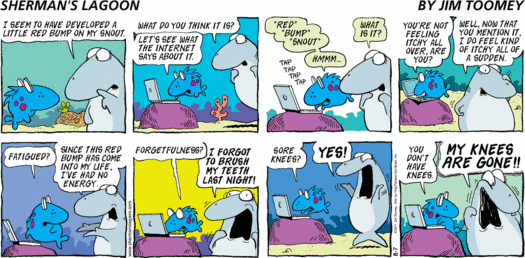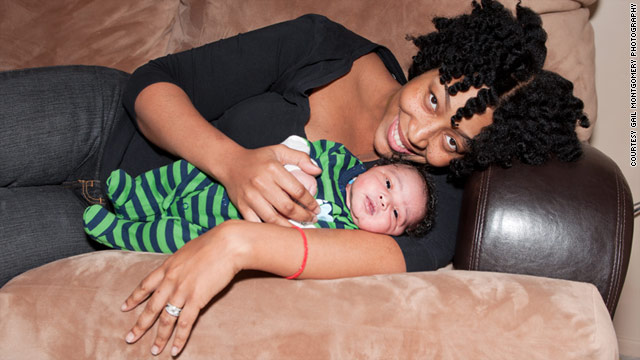August 16th, 2011 by DavedeBronkart in Opinion
No Comments »

An SPM member emailed this, with the playful subject line “A New e-Patient”:

(Click the image to go to the high-res on the comic’s site; © Copyright 2011 King Features Syndicate, all rights reserved.)
Funny comic, but it’s a common misconception that “e-patient” = anyone who googles (or bings, or webmd’s, or…). Wrong. E-patients are empowered, engaged, educated etc – not mindless, and not likely to freak out at the first thing they read.
When you search Read more »
*This blog post was originally published at e-Patients.net*
August 15th, 2011 by Berci in Opinion
No Comments »

Recently, I’ve had an interview with a national newspaper and the woman who performed the interview told me she was surprised that I seemed to be the first doctor in her life who was happy about patients using the internet. Well, she surprised me with this statement as I’ve never thought about that before. But she must be right. There are many doctors who get upset when they find out the patient tried to find information online. They are frustrated as they don’t even know how to use these online tools and have no idea how to help the patients in this perspective.
Myself, I’m pretty much happy about it. I love to hear patients Read more »
*This blog post was originally published at ScienceRoll*
April 30th, 2011 by DavedeBronkart in True Stories
No Comments »

 Two years ago we wrote “Let’s hear it for the ‘d-patients’” — doctors who become e-patients themselves. We said “D-patients prove that patient empowerment is anything but anti-doctor. Heck, sometimes it’s a doctor preservation movement.”
Two years ago we wrote “Let’s hear it for the ‘d-patients’” — doctors who become e-patients themselves. We said “D-patients prove that patient empowerment is anything but anti-doctor. Heck, sometimes it’s a doctor preservation movement.”
A new article in our Journal of Participatory Medicine provides a compelling example: A Physician’s Experience as a Cancer of the Neck Patient: The Importance of Patient Participation. The author, Itzhak Brook MD, makes our point:
I am telling my personal story in the hope that health care providers will realize the difficult challenges faced by a patient diagnosed with cancer and undergoing extensive surgeries. I am also discussing the importance of active participation of the patient and their family members in all phases of care.
JoPM co-editor Charlie Smith adds, in his introductory note: (emphasis added)
You may wonder why a physician’s account of his illness and the frustrations he experienced merit publication in this journal. But, if a doctor has this degree of anxiety, this much difficulty getting information about his care and this degree of struggle making good decisions, then patients can easily understand why they feel so overwhelmed and incapable, at times, of truly “participating” in their own care. What we are advocating for is difficult in the best of circumstances and requires all hands on deck for the task! Read more »
*This blog post was originally published at e-Patients.net*
February 1st, 2011 by DavedeBronkart in Better Health Network, Opinion
No Comments »

I have a Google alert for “e-patient,” and sometimes I’m surprised what it catches. [Recently] it was this:
3 Reasons Steve Jobs Will Be The Ultimate e-Patient
Steve Jobs’ medical leave sets the stage for the upcoming revolution in the production and delivery of medical information at time of diagnosis. 3 things you need to know.
So I’m thinking: “Oh, wow: Is the term ‘e-patient’ going mainstream?” That would be a hoot, because indeed the Society for Participatory Medicine is engaged in spreading the word.
*This blog post was originally published at e-Patients.net*
December 21st, 2010 by Michael Sevilla, M.D. in News, Opinion
No Comments »

 Every once I awhile a story catches my eye as I scan the news websites. There was one this morning on CNN with this catchy title: “Mom Defies Doctor, Has Baby Her Way.” The article describes a story where a mother was going to have her fourth baby. Her previous three were born via C-section. Mom did not want another C-section done, and “defied” her doctor’s order for the procedure. “You’re being irresponsible,” the patient was told.
Every once I awhile a story catches my eye as I scan the news websites. There was one this morning on CNN with this catchy title: “Mom Defies Doctor, Has Baby Her Way.” The article describes a story where a mother was going to have her fourth baby. Her previous three were born via C-section. Mom did not want another C-section done, and “defied” her doctor’s order for the procedure. “You’re being irresponsible,” the patient was told.
The middle of the article talks about the current thinking and statement of the American College of Obstetrics and Gynecology saying that “it’s reasonable to consider allowing women who’ve had two C-sections to try to have a vaginal delivery.” Of course, there’s risks with proceeding with a vaginal delivery and risks of another C-section.
What’s always interesting to me are the comments following the article. I applaud the physicians who are fighting back the anti-physician sentiment and those who are pushing (no pun intended) the only home birth agenda.
In the article, this person is being held up as a hero — as someone who defied the paternalistic medical establishment and did it her way. Good for her — or is it? What if that 0.4-0.9 percent possibility of severe complication occurred and there was a problem with mom and/or the baby? What would happen then? Read more »
*This blog post was originally published at Doctor Anonymous*







 Every once I awhile a story catches my eye as I scan the news websites. There was one this morning on CNN with this catchy title: “
Every once I awhile a story catches my eye as I scan the news websites. There was one this morning on CNN with this catchy title: “







